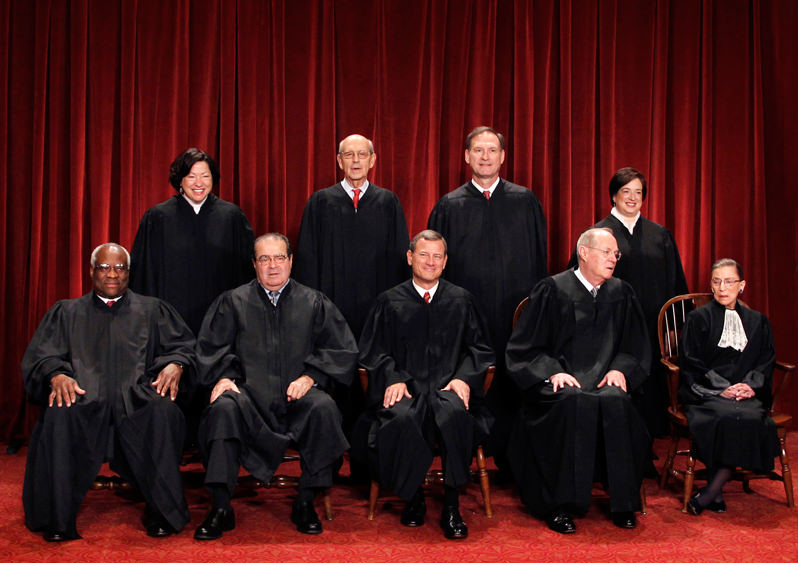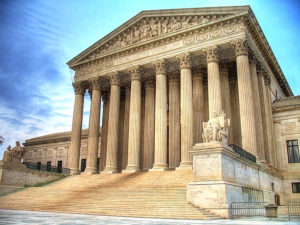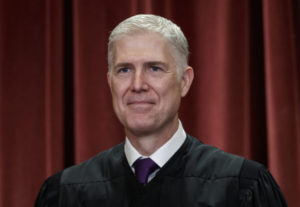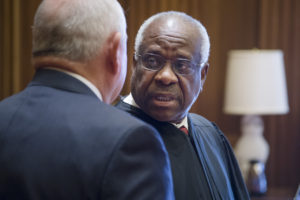The 2016 SCOTUS Awards: A Look Back at the Year That Was
It’s time for Truthdig’s annual—and only partially tongue-in-cheek—review of the highlights, lowlights, pratfalls and pitfalls of the Supreme Court over the past 12 months.
Seated, from left are, Justice Clarence Thomas, the late Antonin Scalia, Chief Justice John Roberts, Justice Anthony Kennedy, and Justice Ruth Bader Ginsburg. Standing, from left are, Justices Sonia Sotomayor, Stephen Breyer, Samuel Alito Jr., and Elena Kagan.(Pablo Martinez Monsivais/ AP Photo)
It’s late December, time for Truthdig’s annual—and only partially tongue-in-cheek—review of the highlights, lowlights, pratfalls and pitfalls of the Supreme Court over the past 12 months.
Before we begin this year’s ceremony—our third, if you’re keeping score at home—bear in mind two ground rules: First, although each SCOTUS term begins in October, these accolades are based on calendar-year performances. Thus, court opinions issued last December don’t count, but any decisions released, or any comments uttered in or out of court, since January 2016 are fair game.
Second, notwithstanding President-elect Donald John Trump’s all-out assault on political correctness, we’re going to abide by our tradition of recognizing all who donned the black robe during our planet’s most recent journey around the sun. In fact, we’re going to be more expansive and diverse than ever, reaching beyond mere membership on the court in handing out awards, and announcing a grand, all-inclusive prize at the end of our pageant—skip ahead only if you must.
And now, without further explanation or apology—and as the court’s marshal announces at the commencement of each proceeding, “Oyez, Oyez, Oyez”—here are your honorees and their categories of distinction.
Gone but Not Forgotten
There’s no suspense here, and no debate, either. Our recipient from the great beyond is Antonin Scalia, who died in February while, fittingly, exercising his Second Amendment rights on a hunting trip in Texas.
Scalia takes the top spot not only because he’s the only justice who expired in 2016, leaving the panel one short of its full complement of nine members, but because of the outsized influence he wielded on American law as a whole during his nearly 30 years on the high tribunal.
As I observed in this column at the time of his demise, Scalia’s passing was “nothing less than a legal and political earthquake.”
Starting with his appointment to the high court in 1986, Scalia was the intellectual spark plug of what I and many other legal commentators have termed a conservative “judicial counterrevolution,” aimed at wresting control of the nation’s most powerful legal body from the legacy of the liberal jurists who rose to power in the 1950s and ’60s under the leadership of then-Chief Justice Earl Warren.
Scalia was a key architect of the jurisprudential theory of originalism (the idea that the Constitution should be interpreted according to the “original meaning” of its terms), and the author of the landmark 2008 5-4 decision in District of Columbia v. Heller, which held for the first time that the Second Amendment protected an individual right to bear arms.
Scalia was also an unvarnished, intemperate and intolerant ideologue, railing against same-sex marriage, voting rights, Obamacare, affirmative action and other progressive causes. Often finding himself in dissent, he became unhinged at times, ridiculing more moderate colleagues for engaging in what he called analytical “argle-bargle” and “interpretive jiggery-pokery,” and for dispensing legal benefits to allegedly undeserving litigants that he called “pure applesauce.”
There won’t soon be another.
He’s Alive
Our honoree is Scalia’s longtime wingman on the bench—Clarence Thomas. The 68-year-old associate justice, known for his hard-right written opinions and his habit of remaining silent during oral arguments, broke a 10-year streak of muteness on Feb. 22, the first court session after Scalia’s death.
In a gun-control case—Voisine v. United States—dealing with the issue of whether misdemeanor domestic assault convictions can block offenders from possessing firearms, Thomas not only asked a few questions, but also cracked a joke that, unfortunately, was told so softly it couldn’t be transcribed by the official court reporter. Members of the press and public on hand were left slack-jawed by his demonstration of vitality.
Not to worry, though: Thomas soon returned to his taciturn ways and hasn’t spoken up since in session. Along the way, he held fast to his conservative views, authoring a 5-3 majority opinion in June (Utah v. Strieff) that expanded the authority of police to detain people on little or no suspicion and search them for contraband.
Thomas also came under fire for alleged extracurricular hijinks, accused in October by a female attorney of groping her at a 1999 dinner hosted by the Truman Foundation in a suburb outside Washington, D.C. As he did with law professor Anita Hill’s charges of sexual harassment in 1991, Thomas vehemently denied the new accusations. Since then, he’s taken the Fifth, in spirit if not literally.
He Could Have Been a Contender
The dubious distinction goes to Merrick Garland, chief judge of the United States Circuit Court of Appeals for the District of Columbia, and President Obama’s choice to replace Scalia.
Garland was originally nominated to the D.C. circuit in 1997 by President Bill Clinton. He was confirmed on a bipartisan Senate vote of 76 to 23.
From the outset, however, Senate Republicans vowed to block Garland’s path to the Supreme Court, despite his record of judicial moderation as an appellate judge. Majority leader Mitch McConnell, R-Ky., rationalized the GOP’s obstruction as a matter of principle, arguing that in an election year, the next president, rather than Obama, should have the opportunity to name Scalia’s successor.
Although Obama has not formally withdrawn Garland’s name from consideration, he signaled at the White House Hanukkah party last week that he has no plans to make a recess appointment. More than 280 days have elapsed since Obama announced Garland as his pick at a March 16 Rose Garden news conference. No Supreme Court nominee has ever waited even half that long for a confirmation hearing.
He Could Be the Next Scalia
The tribute goes to Justice Samuel Alito.
According to some researchers, Alito, along with Thomas, has compiled a more conservative judicial voting record than Scalia. Some, as a result, see Alito as the next ideological leader of the court’s conservative wing.
To be sure, Alito has never attracted the sort of media buzz that surrounded Scalia—he’s dour and dull, while Scalia could be charming and funny. But there’s good reason for the right’s love for “Sammy the Hammer,” as I and others have nicknamed him. He’s unrepentant and unrelenting.
In 2016, Alito left hints of things ultra-right to come in the stinging dissents he authored in Whole Woman’s Health v. Hellerstedt on abortion rights and Fisher v. University of Texas at Austin on affirmative action. He also has set his sights on limiting dues collections by public employee unions, an issue on which the court deadlocked 4-4 last term, and will likely revisit.
Alito may not command a majority on such issues now, but give him time to reach his full potential as incoming President Trump (it’s still hard to say) gets to fill Scalia’s shoes, and all that could change with the banging of the Hammer’s gavel.
The Center Holds … for Now
No one plays to the center on the current court better or more often than Justice Anthony Kennedy.
This year was no exception, as Kennedy wrote the majority opinion upholding the University of Texas’ affirmative action in the Fisher case, and voted with the panel’s liberals to strike down Texas’ restrictions on abortion clinics in the Whole Woman’s Health appeal.
Liberals can only hope that Kennedy, who has had his own instances of right-wing rigidity—he wrote the majority opinion in Citizens United—hews again to the center in the Trump era.
Keeping Up Institutional Appearances
The tilt goes to the headmaster, Chief Justice John Roberts.
Roberts may have sailed through his 2005 confirmation hearing, promoting the laughable metaphor of judges as neutral umpires calling balls and strikes, but there’s broad consensus that he actually cares about the court’s institutional integrity as a third branch of government. That can’t be an easy image to sustain as the court limps along with only eight members, and is almost as divided ideologically as the country as a whole.
Perhaps that explains why the chief has become something of a swinger in his own right. This year, he authored a liberal rebuke of racial discrimination in the selection of death-penalty juries in Foster v. Chatman, but he also voted with the conservatives on affirmative action and abortion rights.
Roberts will have his hands full to keep control of his unruly fiefdom for the foreseeable future.
Growing More Irascible by the Day
Who else but the notorious RBG, Justice Ruth Bader Ginsburg? She’ll be 84 in March, and is a survivor of both colon and pancreatic cancer. And she shows no signs of slowing down.
Among her 2016 achievements, she composed a stirring concurrence on access to abortion facilities in the Whole Woman’s Health case, and wrote a strong majority opinion in Evenwel v. Abbott, affirming the time-honored principle of one-person, one-vote in an important apportionment case from Texas.
Off the bench, Ginsburg caused a ruckus, too, lambasting Trump in July as a “faker” and saying she couldn’t “imagine what our country would be” with him as president. But she also criticized San Francisco 49ers quarterback Colin Kaepernick in October for taking a knee during the pregame playing of the national anthem. She later apologized for both remarks.
Showing No Fear
The nod goes to Justice Sonia Sotomayor. Apart from Thomas, Sotomayor is the court’s only member of a minority. Unlike the Republican, however, she hasn’t given herself over to the Federalist Society or given up on civil rights.
Her dissent in Scheutte v. BAMN, a 2014 decision that upheld Michigan’s ban on affirmative action, was one for the ages. In it, she schooled the majority (including Thomas) on the racial realities of contemporary America, admonishing her colleagues that “race matters,” not only because of persistent racial inequality but “for reasons that really are only skin deep, that cannot be discussed any other way, and that cannot be wished away.”
Although she kept her pen in the drawer in this year’s Fisher case on affirmative action (she joined the majority but didn’t write separately), she nonetheless padded her resume with a landmark death-penalty ruling in Hurst v. Florida. The case overturned Florida’s capital-sentencing scheme because it unconstitutionally removed sentencing decisions from juries and placed all sentencing authority in the hands of judges.
Hitting His Stride
No one has ever doubted the intellectual candlepower of Justice Stephen Breyer. Indeed, in an important 2008 debate with Scalia that has since been uploaded to YouTube, Breyer emerged as the court’s leading theoretician of “living constitutionalism” (the view that fundamental rights evolve and deepen over time), in contrast to originalism. Still, in practice, he was long regarded as the most moderate link in the tribunal’s liberal bloc.
All that began to change in 2015, when Breyer, in dissent, openly questioned the continuing constitutionality of the death penalty in Glossip v. Gross, a case from Oklahoma dealing with lethal injection. This year, he extended his progressive reach into additional areas, crafting the majority opinion on abortion rights in Whole Woman’s Health.
Still Looking for Her Own Voice
Elena Kagan, the court’s most junior panelist, turned in a court low of 11 signed opinions (whether majority, concurring or dissenting) for the entire October 2014-15 term. For the October 2015-16 term, she upped the number to 12, an output that exceeded only John Roberts’ paltry 11 and the departed Scalia’s five.
Kagan did manage, however, to distinguish herself with the majority opinion in the Voisine lawsuit, upholding domestic violence restrictions on gun ownership. Here’s hoping she delivers more of the same going forward.
Man of the Year
Drum roll, please.
And the winner of this year’s grand prize—our “man” of 2016 (and I use the gender-specific reference with complete premeditation because he hated it when Time magazine dubbed him “Person of the Year” earlier in December)—is none other than our own soon-to-be Dear Leader, Donald J. Trump.
Like his North Korean counterpart—Kim Jong Un—Trump deserves every available honor, including the most coveted trophy among this year’s SCOTUS awards. Even though he isn’t a lawyer and has never served as a judge, on Jan. 20, he will be sworn in by Chief Justice Roberts as the nation’s 45th president. Thereafter, he’ll set his undersized hands and fingers to the task of remaking the Supreme Court for a generation or more.
Trump—not Barack Obama—will get to name Scalia’s successor. Trump—not Hillary Clinton—will get to replace the 84-year-old Ginsburg, the 80-year-old Kennedy and the 78-year-old Breyer should any or all of them fail to endure. Could anyone have a greater impact on the Constitution and our most powerful judicial body? Doubtful.
Next December, if Dear Leader permits, we’ll return with another edition of our annual SCOTUS awards to review the carnage. In the meantime, enjoy your stay in Trumpland. You’ve earned it.
With an uncertain future and a new administration casting doubt on press freedoms, the danger is clear: The truth is at risk.
Now is the time to give. Your tax-deductible support allows us to dig deeper, delivering fearless investigative reporting and analysis that exposes what’s really happening — without compromise.
Stand with our courageous journalists. Donate today to protect a free press, uphold democracy and unearth untold stories.





You need to be a supporter to comment.
There are currently no responses to this article.
Be the first to respond.